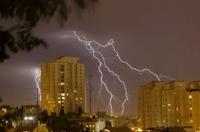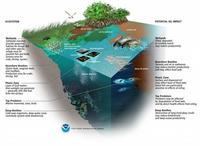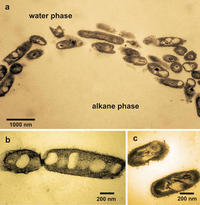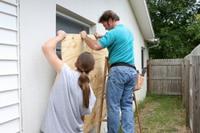-
Mother Nature offers best protection for coastal communities’ infrastructure
Extreme weather, sea-level rise, and degraded coastal ecosystems are placing people and property at greater risk of damage from coastal hazards. The likelihood and magnitude of losses can be reduced by intact ecosystems near vulnerable coastal communities. Scientists say that natural habitats such as dunes and reefs are critical to protecting millions of U.S. residents and billions of dollars in property from coastal storms.
-
-
Training volcano scientists saves lives

Scientists and technicians who work at volcano observatories in nine countries are visiting Mount St. Helens and the U.S. Geological Survey Volcano Science Center’s Cascades Volcano Observatory this week to learn techniques for monitoring active volcanoes. The International Training Program in Volcano Hazards Monitoring is designed to assist other nations in attaining self-sufficiency in monitoring volcanoes and reducing the risks from eruptions.
-
-
Houston, Texas boasts world’s best lightning detection system

With thousands of strikes each year, Houston is the lightning center of Texas and one of the world’s most lightning-prone areas. Studies show about 1,800 thunderstorms pound the Earth at any given moment, resulting in about fifty lightning strikes every second. The country’s best system to detect lightning strikes — located in and around the Houston area — just got better, thanks to a complete overhaul and new software.
-
-
Climate change, severe weather threaten U.S. energy sector: Dept. of Energy
The U.S. entire energy system is vulnerable to increasingly severe and costly weather events driven by climate change, according to a U.S. Department of Energy report published last week. These climate and weather trends — increasing temperatures, decreasing water availability, more intense storm events, and sea level rise — each independently, and in some cases in combination, could restrict the supply of secure, sustainable, and affordable energy critical to U.S. economic growth.
-
-
Quebec deadly accident revives pipeline vs. rail debate

The sharp increase in U.S. domestic oil production in the last four years, and the opening by the Obama administration of new areas for drilling, have greatly benefitted U.S. rail companies, which now enjoy the added business of transporting oil from places where pipelines do not exist.U.S. domestic shipments of oil have increased from 9,500 carloads in 2008 to more than 230,000 carloads last year. The deadly Lac-Megantic, Quebec crude-oil train accident revives the debate about the relative safety merits of two modes of transporting oil over long distances – rail vs. pipeline. Proponents of the Keystone XL pipeline project say the Quebec accident will boost support for their cause.
-
-
U.S. Emergency Alerting System (EAS) vulnerable to hacking
The U.S. Emergency Alerting System (EAS) is designed to allow for quick alerts during an emergency. Researchers uncovered vulnerabilities in the digital alerting systems, vulnerabilities which allow an attacker remotely to log in over the Internet and manipulate any system function. The attacker could disrupt a TV or radio station’s ability to transmit and could disseminate false emergency information.
-
-
Using crowdsourcing for earthquake monitoring
The U.S. Geological Survey (USGS) and other scientific institutions are using social media and crowdsourcing to learn more about earthquakes, according to a new report. These techniques provide inexpensive and rapid data to augment and extend the capabilities provided by traditional monitoring techniques.
-
-
Assessing the social, economic effects of Deepwater Horizon spill

Numerous studies are under way to determine the impacts of the Deepwater Horizon oil spill on the Gulf of Mexico, but the extent and severity of these impacts and the value of the resulting losses cannot fully be measured without considering the goods and services provided by the Gulf, says a new report from the National Research Council (NRC). The report offers an approach that could establish a more comprehensive understanding of the impacts and help inform options for restoration activities.
-
-
Advancements in technology making it easier to fight wildfires
Following the Arizona wildfire disaster, many have been suggesting that new regulations are needed to control the spread of wildfires. Experts say that advancements in technology may well offer a more effective approach to saving lives and making it easier for firefighters to control wild blazes.
-
-
Wildfires contribute more to global warming than previously thought
Wildfires produce a witch’s brew of carbon-containing particles. A range of fine carbonaceous particles rising high into the air significantly degrade air quality, damaging human and wildlife health, and interacting with sunlight to affect climate.
-
-
Oil-devouring microbe communities a mile deep in the Gulf

The Deepwater Horizon explosion on 20 April 2010, caused the largest marine oil spill in history, with several million barrels of crude oil released into the Gulf of Mexico over the course of three months. Soon after the spill began, a massive oil slick was visible from orbiting satellites, yet once the underwater gusher was sealed, obvious traces of the crude oil disappeared much sooner than nearly all observers predicted. Some of the oil evaporated; some was skimmed off. Microbes “ate” much of the oil as well.
-
-
Firefighting experts calling for easing environmental restrictions on prescribed burns
In the aftermath of the Arizona wildfire which killed nineteen firefighters in Yarnell, Arizona, there are growing calls for easing environmental restrictions which currently limit brush clearing and prescribed burns. It typically costs $5 per acre to conduct a prescribed burn in the wilderness, and about $50 per acre near residential areas. Thinning an area with chain saws and other equipment can cost around $500 per acre. These figures are small when compared to the $1,200 per acre cost of fighting the wildfire in Arizona.
-
-
Treating oil spills with chemical dispersants may do more damage than good
Treating oil spills at sea with chemical dispersants is detrimental to European fisheries. Post-spill chemical dispersants may reduce problems for surface animals, but the increased contamination under the water reduces the ability for fish and other organisms to cope with subsequent environmental challenges.
-
-
Improving the reliability, resiliency of post-Sandy N.J. electric grid
According to NOAA, prolonged electrical outages, largely because of storms, have been steadily increasing in frequency since 1995. Sandia Lab will help East Coast communities devastated by Hurricane Sandy boost the resiliency of their electric grids, so they can be better prepared to deal with natural disasters in the future.
-
-
Gauging how residents in storm-prone regions react in the event of an imminent storm

StormView software program gauges how residents of hurricane-prone regions react to warnings and prepare for storms. The program is designed to be as realistic as possible in order accurately to assess how people would react in the event of an imminent storm.
-
More headlines
The long view
The Surprising Reasons Floods and Other Disasters Are Deadlier at Night
It’s not just that it’s dark and people are asleep. Urban sprawl, confirmation bias, and other factors can play a role.
Why Flash Flood Warnings Will Continue to Go Unheeded
Experts say local education and community support are key to conveying risk.
